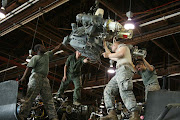Workshop for Part 3
Overall
1. What do you like best about the paper? The research. I learned a lot that I didn’t know.
2. Email the author and ask for one particular concern that s/he had about the draft. Examine that area and see if you can offer the author helpful suggestions. Ambers concerns were how she cited her sources.
Thesis
3. Does the author clearly express his/her opinion of the topic in the thesis? What argument does the thesis make? Yes she did. She supports funding for early childhood programs.
4. What group of people agrees with the author? Groups that agree with funding childhood programs. What group disagrees with the author? Groups that do not feel that children need early tools to be successful in later life.
5. Does the paper have an argumentative thesis statement using ALTHOUGH and BECAUSE? Yes
Content
6. On a scale of 1 to 10, how interesting did you find this paper to read? 10
7.Where can the author more fully develop ideas, either by providing examples or explaining/clarifying concepts for the reader? Be specific (e.g. “the 3rd is dullsville”; “the conclusion is really vague”). I found that everything was well developed. I would like to see some examples of children that went through those types of programs as a child and how they are doing at an older age, if possible.
8.What kinds of objections might someone who disagrees with the author’s point of view raise? If there are none, go back to #3. Someone could say that they do not believe that early childhood programs benefit the children and how would the programs get funded as much as they need to be successful.
9.Has the author dealt with these objections? yes
10.Is the relationship between each paragraph and the thesis clear? Yes
Style
11. Are there easy transitions from one paragraph to the next, or does the author jump from topic to topic? Yes she did a very good job at transitioning
12. Does the opening of the essay capture the reader’s attention? Yes How so? The quote and when she said, “Our nation is making a tragic mistake,” is a great way to make the reader wonder what she is talking about.
13. Does the concluding paragraph serve to bring the discussion to an end that logically follows from the thesis and its direction? Yes
Research
14. How many different sources are cited in the paper (don’t look at Works Cited; look at the parenthetical citations. The medium does not matter.) Seven
15. Does the author rely heavily on just 1 or 2 sources, or does the author equally use all of the sources to support the paper’s thesis? I found that she equally used her sources.
16. Does the author have more quotes in his/her paper than personal opinion? I believe so
17. Are there any sources listed on the Works Cited that are not cited within the body of the essay? (This is a no-no) No
18. Is all the information retrieved from research, including opinion, ideas, paraphrases, quotes, and statistics, cited with in-text (parenthetical) citations? If not, list specifics of what needs to be cited (friends don’t let friends turn in plagiarized papers). I believe so. I wondered about some sentences in paragraph five. But overall everything seemed cited correctly
19. All quotes in research papers should be commented upon. Does the author comment after every quote? Yes
In your first sentence of paragraph four, you used by in the wrong spot.
Monday, March 30, 2009
Subscribe to:
Post Comments (Atom)








No comments:
Post a Comment